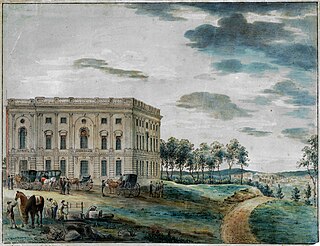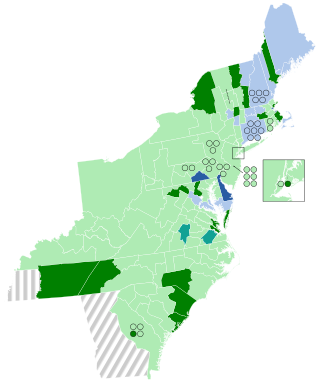Related Research Articles

The 9th United States Congress was a meeting of the legislative branch of the United States federal government, consisting of the United States Senate and the United States House of Representatives. It met in Washington, D.C., from March 4, 1805, to March 4, 1807, during the fifth and sixth years of Thomas Jefferson's presidency. The apportionment of seats in the House of Representatives was based on the 1800 United States census. Both chambers had a Democratic-Republican majority.

The 1806–07 United States House of Representatives elections were held on various dates in various states between April 29, 1806 and August 4, 1807. Each state set its own date for its elections to the House of Representatives before the first session of the 10th United States Congress convened on October 26, 1807. They occurred during Thomas Jefferson's second term. Elections were held for all 142 seats, representing 17 states.

The 1804–05 United States House of Representatives elections were held on various dates in various states between April 24, 1804, and August 5, 1805. Each state set its own date for its elections to the House of Representatives before the first session of the 9th United States Congress convened on December 2, 1805. The elections occurred at the same time as President Thomas Jefferson's re-election. Elections were held for all 142 seats, representing 17 states.

The 1806–07 United States Senate elections were held on various dates in various states. As these U.S. Senate elections were prior to the ratification of the Seventeenth Amendment in 1913, senators were chosen by state legislatures. Senators were elected over a wide range of time throughout 1806 and 1807, and a seat may have been filled months late or remained vacant due to legislative deadlock. In these elections, terms were up for the senators in Class 3.

The 1806 United States House of Representatives elections in New York were held from April 29 to May 1, 1806, to elect 17 U.S. Representatives to represent the State of New York in the United States House of Representatives of the 10th United States Congress.

The 1808 United States House of Representatives elections in New York were held from April 26 to 28, 1808, to elect 17 U.S. Representatives to represent the State of New York in the United States House of Representatives of the 11th United States Congress. At the same time, a vacancy was filled in the 10th United States Congress.

Elections to the United States House of Representatives were held in Pennsylvania on October 14, 1806, for the 10th Congress.

Elections to the United States House of Representatives were held in Pennsylvania on October 9, 1804, for the 9th Congress.

Elections to the United States House of Representatives were held in Pennsylvania on October 13, 1812, for the 13th Congress.
Elections to the United States House of Representatives were held in Pennsylvania on October 14, 1828, for the 21st Congress. Members of three different parties were elected to the 21st Congress, the first time in US history that a third party won seats. The new Anti-Masonic Party won a total of 5 seats, 1 of which was in Pennsylvania.

Pennsylvania held its elections October 11, 1814.

Elections to the United States House of Representatives were held in Pennsylvania on October 11, 1808, for the 11th Congress.

A special election was held in Pennsylvania's 4th congressional district on October 8, 1805, to fill a vacancy left by the death of John A. Hanna (DR) on July 23, 1805, before the first session of the 9th Congress.

A special election was held in Pennsylvania's 11th congressional district on October 8, 1805, to fill a vacancy left by the resignation of John B. Lucas (DR) before the first session of the 9th Congress to take a position as district judge for the District of Louisiana.

A special election was held in Maryland's 7th congressional district on September 27 and October 4, 1806 to fill a vacancy left by the resignation of Joseph H. Nicholson (DR)
A special election was held in South Carolina's 6th congressional district June 1–2, 1807 to fill a vacancy left by the death of Levi Casey (DR) on February 3, 1807.

On October 8, 1816, a special election was held in Pennsylvania's 9th district, the second special election in that district in the 14th Congress. The reason for the special election was Thomas Burnside (DR)'s resignation to accept a judicial appointment in April of that year. Burnside himself had been elected to the seat in the previous special election.

On March 8, 1838, a special election was held in Pennsylvania's 9th congressional district to fill a vacancy left by the resignation of Henry A. P. Muhlenberg (D) on February 9, 1838.
There were two special elections in Georgia's at-large congressional district in 1806; one on September 15, 1806, to fill a vacancy caused by the resignation of Joseph Bryan (DR) earlier that year, and the other sometime before December 6, 1806, to fill a vacancy caused by the resignation of Thomas Spalding (DR) earlier that year.